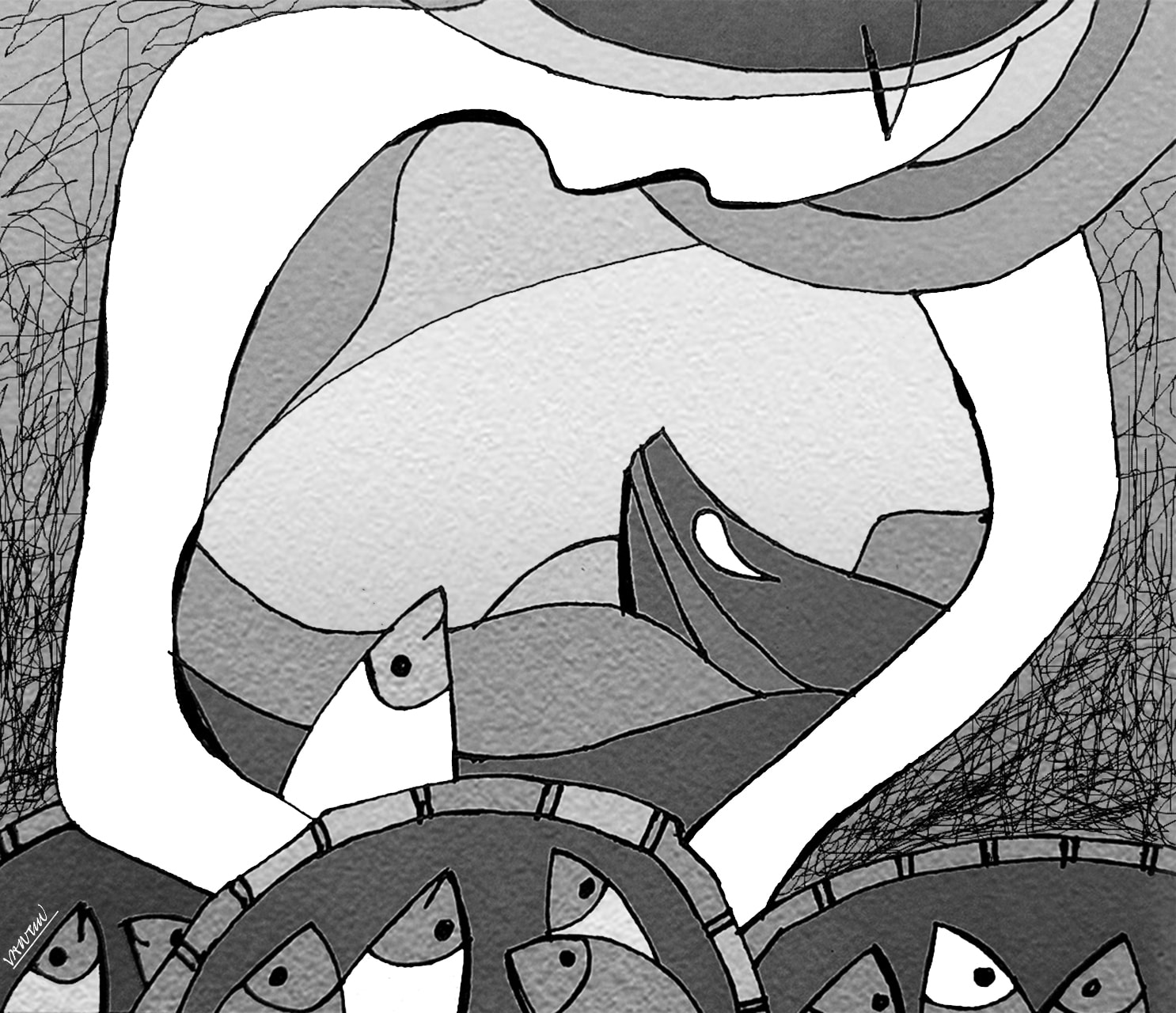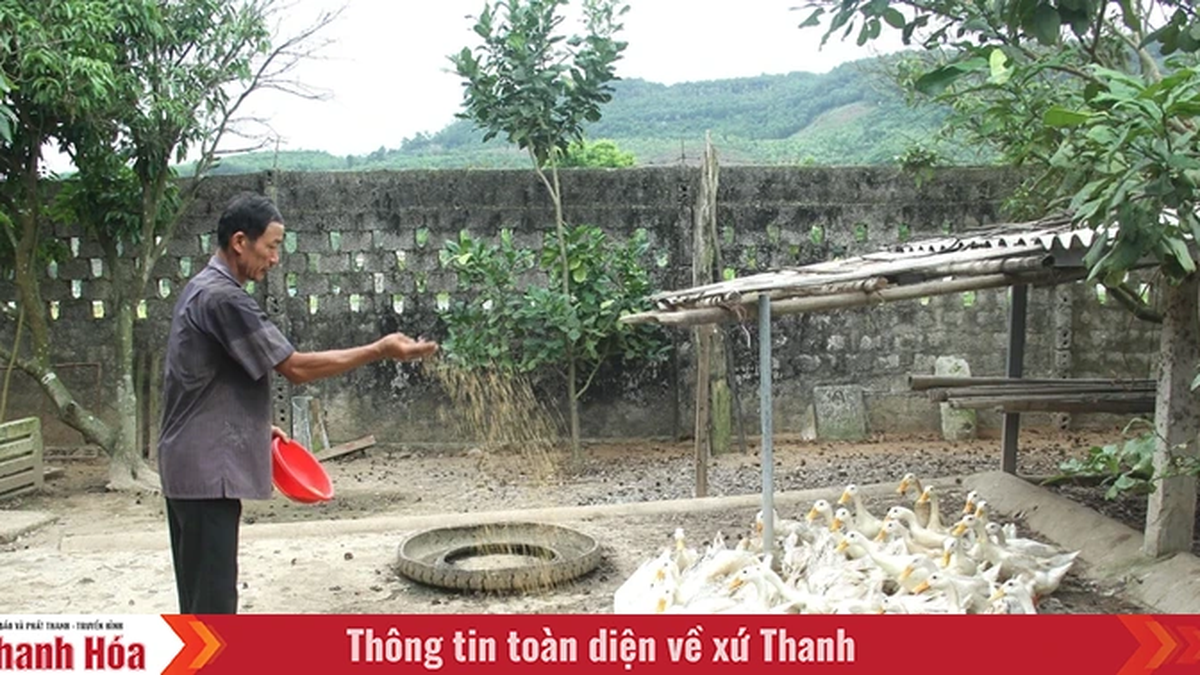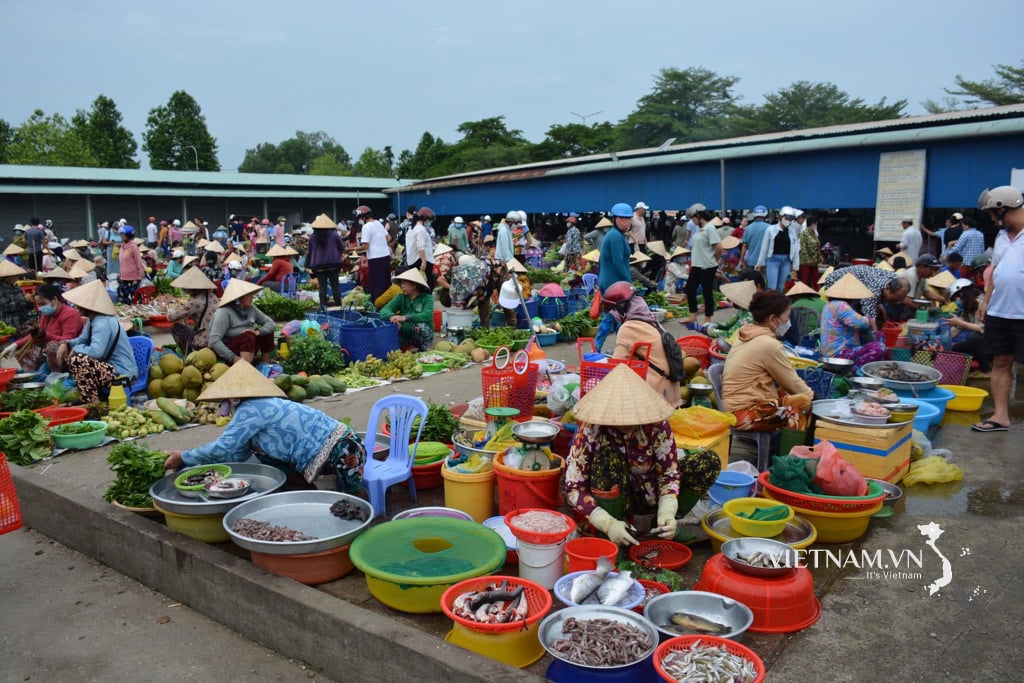The sound of footsteps of memories came back from the end of her heart. She listened. When dawn began to reveal its fresh face, it was also the time when the sea fish market became bustling with fishing boats docking at the dock.
Illustration: VAN TIN
At this time, the women who carried fish for hire got up and were about to pack their baskets. The fishermen's families were also ready as buyers. All the bustling sounds seemed to have gathered around this fish beach.
She stood up and walked down to the water's edge. She walked around the shopping area, the bright blue eyes of the fish looking at her as if to say, "Do you remember anything?"
*
* *
How could she forget? Right here. Almost twenty years ago, she had sat there from the moment she heard the news of the storm until it had subsided. When she had known for sure that the fishing boats of the fishing village, including her husband’s boat and her two sons’ boat, along with two relatives’ boats, had been destroyed by the storm right at sea, she had sat there.
Many people went fishing and never returned. Their bodies were buried deep in the sea and could not be found. Her sons Hy and Vong went to sea for the first time right after leaving school.
She held her tiny baby Ti in her arms and cried and cried for days in this place. Ti was hungry, she was hungry, but she didn't care. She waited day and night, hoping to recover her husband and son's bodies.
A few days later, when she heard that her husband had been rescued, she cried until she was numb when she saw her husband's body, without a piece of cloth in a plastic bag. She fainted. Other wives and mothers were in even more pain because they had to wait in vain.
After burying her husband, just 3 days later, she received the news that it was a mistake. This time, the same body was her husband. She had to bury him properly again. Each time, she received support from the local government and timely aid from the people of the whole country.
She was one of the very few “Chanchu widows” who had their loved ones buried, and it was rare to bury two husbands. There were many wind graves erected with the names of the deceased, but they were filled with indescribable sadness.
Returning to her simple home, she lived as if she were dead. Thanks to the encouragement and sharing from individuals and groups, from small to large organizations, combined with her familiarity with enduring storms, she was able to recover. The widows went back to the fishing port to wait for other ships to return so they could continue living, because what else could they do but cling to the sea.
Chanchu hamlet resounded with cheers every time a fishing boat reached the shore. Some families abandoned this profession altogether because there were no men left to go to sea. They left their homeland to seek refuge elsewhere from the wrath of the sea.
Sometimes she wanted to do that, but then she thought again, the only way was to go to the sea every day and look at the sea, hoping that her husband and children's souls would still be there to protect her. There were two graves with bones, but she didn't know which was her husband's grave; next to them were two wind graves, which made it difficult for her to leave this land.
*
* *
Ti grew up day by day. At school, her name was Nguyen Thi Tuong Lai. Neighbors, especially fishing friends, teased the couple for naming their child like a ringing bell.
When she was pregnant with Ti, knowing it was a girl, her husband was so happy. He said, "We have both a boy and a girl, so why do we need anything else? My life is enough, I'll name it."
She smiled and thought, she had never asked for any rights, Hy and then Vong were all placed by him, who else would come here. But she really hoped, when the two boys were about the same age and were strong enough to row and wanted to go to sea, he said any job was good, if he didn't have money to go to the district or province to study, he would just work at sea with his father.
Learning that much is not enough, but life will teach you more. If everyone learns and does this job or that job, then let the sea die. The sea is a gift from heaven. If you don't accept it, you are not worthy of being a seafarer. I thought that a family with three men like yours would be much better off in the future. Hope for the Future. Who would have thought...
When Ti was in 9th grade, there was a contest in the district that she remembers very clearly: writing a letter to the UPU. She only remembers that much, she doesn't know what the topic was or what he wrote to win the prize.
Oh my god, his literature teacher said that Ti is a special student who just won first prize nationally and third prize internationally. I am happy and proud to have a student like that, auntie. She shook her head and held the teacher's hand and asked. What did he write, teacher? The teacher simply said that he wrote about a storm at sea.
Ti's bonus back then was a huge sum of money that she couldn't even calculate, since all the times she had carried fish for hire added together could only equal it. She bought some new roofing sheets to replace the old leaky ones.
The district committee gave Ti a brand new, good bicycle, and the whole neighborhood was happy with her and her son. Ti went to Tam Ky to continue his studies at a specialized high school. The literature teacher sent Ti to stay with a relative, so the mother was less worried.
One day when Ti entered university in Saigon, not long after, she received news that a Japanese family had traveled from far away to Vietnam to find Ti during a long trip .
I thought I was just visiting the girl who won an international award for her article about the sea a few years ago, but who would have thought that the couple wanted to adopt Ti and send her to Japan to continue her studies? After welcoming them in Saigon, Ti called and said she would take them to visit her mother in three days.
Receiving the call from Ti, she looked back and forth at the shabby house, looked at the old, yellowed cups and glasses, then looked at other things in the house and saw that everything was as old as she was, and she was shocked. She ran to the village chief to explain the situation.
He said, "Never mind, spend what you have, you can't afford to buy everything. I'm poor and a widow, that's not something you should worry about." She listened and went home, going in and out, her heart aching.
The Japanese couple not only visited her family but also visited some houses in the fishing village. They went to the graves of her two husbands to burn incense, not forgetting the two wind graves and the unfortunate graves lying next to them.
She saw the Japanese woman's tears slowly rolling down and felt sorry for her two sons when she learned that this mother also had the same pain as her.
Ti didn't know Japanese yet, luckily they had an interpreter. She choked up when they suggested sending Ti to Japan, where he could get a good education, and if she wanted, she could follow him, because their place was near the sea.
She rubbed her eyes several times and looked out to sea. The early afternoon winds blowing in from the sea were so strong that they seemed to shake every old pillar of the house and overturn every thought she had before that proposal.
Without answering them, she asked permission to leave the house and go up the sand hill to burn incense at four graves. Then she went down to the sea, immersed herself in the water until it covered her face, and whispered to the water.
Well, the three of us will stay in our homeland. I ask for your permission to let Ti go so that he can have a future as you wish. I heard there is a sea there too. If you miss your son, you can come and visit him.
She bowed her head to the Japanese couple with tears streaming down her face. The couple and Ti understood. Ti rushed to hug his mother. Ti cried loudly, she knew those were tears of sadness mixed with tears of joy.
*
* *
It was also this very place, where she used to sit and wait for her husband to return with a boat full of fish at dawn, where she used to cry when she received her husband's body in her arms at dusk after a storm, where she sat every night hugging her knees, staring into space and thinking about the future when her little girl Tuong Lai started to grow up, when her gray hair gradually turned white.
She returned and sat quietly in the dark waiting for the morning. This was her first time back home since the day she went to Japan with her son Ti. There, Ti continued her studies and married a Vietnamese man who had been in Japan for many years, as arranged by her adoptive parents.
She also had a stable job in a fish shop, processing fish, a job she could not give up. She returned to her hometown with more sadness than joy, visiting her old fishing village relatives and widowed sisters in the orphanage that people often called "Chanchu hamlet".
With the money she earned abroad, she brought back to support Binh Minh commune to strengthen the school, and contributed a little to build a road connecting the coastal commune with Ha Lam town, which is said to be soon recognized as a type of urban area.
The afternoon gradually fell. A peaceful day had passed in peace. Every house was brightly lit. Tonight she would sleep at the house of a fishmonger friend to reminisce about the past, tell stories of the present, listen to the murmuring waves of the countryside again, tomorrow morning she would fly to Japan, in just a few days Ti would give birth to her first child. She would name the baby Ha Lam.
Source: https://baoquangnam.vn/noi-binh-minh-sang-mai-3156307.html

























































![[Maritime News] Container shipping faces overcapacity that will last until 2028](https://vphoto.vietnam.vn/thumb/402x226/vietnam/resource/IMAGE/2025/7/30/6d35cbc6b0f643fd97f8aa2e9bc87aea)













































Comment (0)